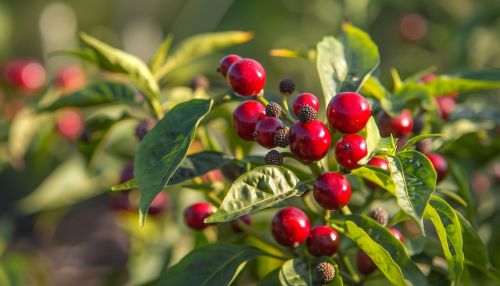Black pepper
Introduction
Black pepper (Piper nigrum) is a flowering vine in the family Piperaceae, cultivated for its fruit, which is usually dried and used as a spice and seasoning. The fruit, known as a peppercorn when dried, is approximately 5 millimetres (0.20 in) in diameter, dark red when fully mature, and, like all drupes, contains a single seed. Peppercorns, and the powdered pepper derived from grinding them, may be described as black, white, or green, depending on the method of their preparation.
History
Black pepper is native to present-day South India and is extensively cultivated there and elsewhere in tropical regions. Vietnam is the world's largest producer and exporter of pepper, producing 34% of the world's Piper nigrum crop as of 2013. The word "pepper" has roots in the Sanskrit word pippali for long pepper. Ancient Greek and Roman cooks used black pepper in recipes. It was very expensive, and for many centuries it was used as a currency.
Cultivation and Production


Black pepper is a perennial plant that requires a long rainy season, fairly high temperatures, and partial shade for best growth. Propagation is generally by stem cuttings, which are set out near a tree or a pole that will serve as a support. Pepper plants are sometimes interspersed in tea or coffee plantations. They can also be grown in soil that is neither too dry nor susceptible to flooding, moist, well-drained and rich in organic matter.
Processing
Black, white, green, and red peppercorns all come from the same plant, but they are harvested at different times and processed in different ways. Black peppercorns are the most common form found in American kitchens. They are picked when they are almost ripe and put out to dry in the sun until they are dark brown or black. The outer layer of the peppercorn is left on, giving it a distinctive, pungent flavor.
Culinary Uses
Black pepper is used as a spice in nearly all the world's cuisines as a pungent, spicy, heating agent for food due to the presence of capsaicin and piperine. Teaspoons of ground pepper have been found tucked into the nostrils and in the stomachs of Egyptian mummies, as it was believed to ward off evil spirits. It is also a common ingredient in medicinal teas and a standard component of the mulling spices used to make mulled cider, wine, and beer.
Health Effects
Black pepper has a long history of use in traditional medicine and is a source of piperine, a molecule that enhances the bioavailability of other nutrients and drugs. It has been used as a digestive aid, a treatment for coughs and colds, and a topical treatment for pain and inflammation. However, excessive consumption can cause gastrointestinal irritation, bleeding from the stomach, and kidney damage.
Economic Importance
Black pepper is one of the most commonly used spices worldwide. It has been a precious commodity for centuries and was once used as a form of currency. Today, it continues to be a significant agricultural commodity. It is a major export product for several countries, including India, Indonesia, and Vietnam.
